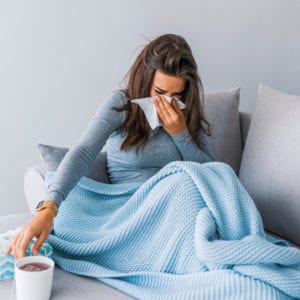 Santa Cruz, Scotts Valley CA
Santa Cruz, Scotts Valley CA
Does it seem as if you are always sick, or that you get over an illness only to contract a new one right away? The answer to your health problems actually could be found in your bedroom. New and evolving research continues to show a link between sleep deprivation and a compromised immune system. In short, if you do not get enough quality rest on a given night, your body becomes more susceptible to infections. Your sleep apnea dentists in Scotts Valley at Ebrahimian Integrative Dentistry are here to provide a deeper exploration of this issue.
What happens when you do not get proper sleep?
When you are asleep, your body continues to work by producing proteins. These proteins provide valuable protection against problems such as stress and inflammation. These proteins also keep your immune system functioning at its best—neutralizing bacteria and viruses that enter your body before they can cause illness or infection.
We all experience a sleepless night on occasion, but failing to get the right amount of sleep over a prolonged amount of time has effects on your physical and mental well-being. A 2017 study by the Medicine Sleep Center at the University of Washington in Seattle examined 11 pairs of identical twins who had differing sleep patterns. Their findings? The twin that was sleep-deprived had a depressed immune system and an increased inflammatory response.
Take ownership of your sleep
Adults between the ages of 18 and 60 are recommended to get an average of seven hours of sleep each night, but the Centers for Disease Control and Prevention estimate that approximately one out of every three adults sleeps less than the recommended amount of hours each night. If your schedule makes it difficult to sleep for seven hours, remember that six hours of quality sleep is better than seven hours of mediocre sleep. You can take steps to improve your sleep environment and your quality of sleep. These measures include making your bedroom as dark as possible, setting the thermostat between 60 and 67 degrees, minimizing screen time before going to bed, reserving your bedroom solely for sleep, and avoiding caffeine after midday.
Sometimes, sleep disruptions have nothing to do with your environment or habits and are caused by the presence of a sleep breathing disorder. These disorders have been estimated to affect 50 to 70 million people in the U.S., according to data compiled by the American Sleep Association. One of the most well-known, and serious, sleep breathing disorders is obstructive sleep apnea. Estimated to affect 20 percent of adults in industrialized countries, sleep apnea occurs when the airway becomes blocked during sleep. These blockages can be partial or complete, disrupting the sleep cycle and making the patient constantly feel fatigued no matter how many hours of sleep they get on a nightly basis.
The major symptom for sleep apnea is snoring
Other commonly reported symptoms of sleep apnea include frequent daytime sleepiness, broken and fragmented sleep, waking up with headaches, difficulty concentrating, poor performance at work and school, or dry mouth. While snoring is the primary warning sign of sleep apnea, you can have sleep apnea without being a snorer. It also is important to remember that anyone of any age can suffer from sleep apnea.
Sleep apnea treatment in Los Gatos
The sleep apnea dentists at Ebrahimian Integrative Dentistry have specialized training to identify the presence of a sleep breathing disorder. After analyzing the results of a sleep study that you can administer in the comfort of your own home, Drs. Max and Ariana Ebrahimian can provide treatment. Our preferred method of sleep apnea treatment is oral appliance therapy, which entails prescribing a customized mouthpiece that guides the lower jaw forward and encourages an open airway throughout the night.
To learn more about how Ebrahimian Integrative Dentistry can help diagnose and treat sleep apnea, call our office at (831) 438-4411 to schedule a consultation.
Ebrahimian Integrative Dentistry is proud to serve the oral health needs of patients in Los Gatos, Santa Cruz, and Scotts Valley, California.